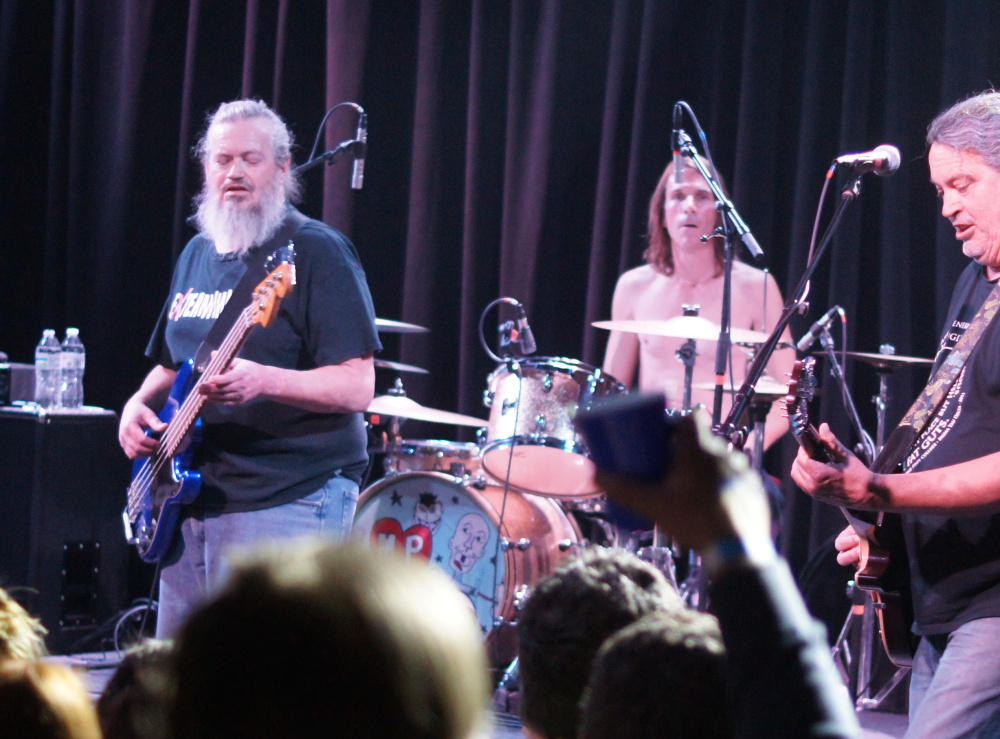If Meat Puppets have always felt like elder statesmen in alternative rock, that’s because in a lot of ways, it’s the case. Outside of the independent circuit and college radio stations, the general public didn’t become aware of them in any major way until Nirvana played three of their songs in their 1993 MTV “Unplugged” performance, and their only song to reach the charts came in the band’s fourteenth year.
Furthermore, their music sounded old even when they were young – like Bob Dylan, the Grateful Dead, or Violent Femmes, they bent traditional music into contemporary styles, producing distinctly American music that remains out of step with their moment, or any other.
And so coming to Port City Music Hall as the old, weird veterans of independent music seemed to be a role that suited them. They showed great cheer throughout a gregarious set, anchoring a bill that also included Mike Watt and the Jom & Terry show and evening opener Grant Hart. The entire bill served not only as a robust overview of 1980s college rock, but also a reunion of the punk-rock label SST Records, on which Meat Puppets, Watt (with Minutemen), and Hart (with Hüsker Dü) collectively released a breathtaking stretch of great albums in the early-to-mid 1980s.
While Meat Puppets were the headliners, they and the bassist Watt played sets of what felt like roughly similar length, even if Watt’s likely contained twice as many songs due to his affection for songs that are two-minute torrents of ideas along with the Meat Puppets’ propensity for attaching extended jams to the ends of their own compositions. Watt, now age 59, joked that his eyes are getting too bad to read his set list, but his fingers remained as nimble and strong as ever, his bass tones and instincts remaining singularly his own.
His rapid, acrobatic set comprised songs from throughout his life, with an emphasis on early Minutemen numbers – “The Glory of Man” and “Bob Dylan Wrote Propaganda Songs” being two highlights, with guitarist and singer Tom Watson capably filling in for the Minutemen’s late D. Boon – and a handful of covers by artists such as the Stooges and Roky Erickson. The democratic nature of Minutemen’s approach to music was fully apparent in the fact that the band’s bassist is not only able to carry the legacy decades later, but can offer fans an authentic Minutemen experience. Short of Paul McCartney, it is difficult to imagine any other bassist doing the same for his or her former band.
The Meat Puppets still remain mostly intact, and will be as long as the brothers Curt and Kris Kirkwood are out in front. In concert, the strains of their music that originate in everything from country-western to norteño emerge in distinct colors, highlighting the fact that this band could only have come from the Southwest.
They leaned hard into this aspect of their sound, even covering the traditional folk song “Whiskey in the Jar” and the honky-tonk classic (popularized by George Jones) “I’m Ragged But I’m Right.” Their own material included the baroque waltz “Plateau,” the hoedown “Lost,” and the kaleidoscopic “Up On the Sun,” but not their lone hit (“Backwater”). They’ve made records into this decade, but largely stayed clear of their more recent output – although a highlight was the whistling melody and oddball tempo shifts of 2009’s “The Monkey and the Snake.”
In an era when musicians overshare on Twitter and you can freely chat back with many of them, it is hard to imagine a time when breaking down the barriers between band and audience, the way the SST bands did, was a refreshing, revolutionary leap. However they managed it, they were successful, reverberating through three generations now. Proof was found throughout the venue, in the way Hart was approach by a fan telling him how much his music meant, the numerous shouts of “thank you” to Watt at the closing of his set, and the rapturous reaction to Meat Puppets’ more electric songs.
Robert Ker is a freelance writer who lives in Portland.
Send questions/comments to the editors.



Comments are no longer available on this story